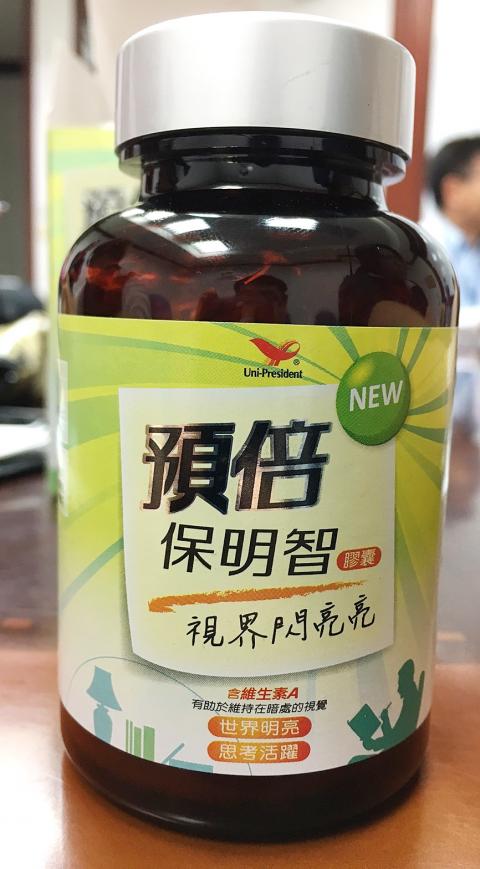Uni-President Enterprises Corp (統一企業) has reported that a bilberry extract dietary supplement was found to contain an ingredient contaminated with radioactive cesium-137 at levels above the regulated safety standard and is recalling the product, the Food and Drug Administration (FDA) said yesterday.
The company had sent samples of the ingredient Extracyan — a cateco-anthocyanidins standardized extract of bilberry fruit — used in its dietary supplement Yu-bei “eye and brain protection capsules” (預倍保明智膠囊) to the Atomic Energy Council’s Institute of Nuclear Energy Research for examination.
The company yesterday notified the FDA after a preliminary examination found that the Extracyan contained radioactive cesium-137 that produced 477 becquerels per kilogram (Bq/kg).

Photo courtesy of the Food and Drug Administration
The FDA said the capsules were commissioned to and manufactured by Chung Nan Biotech Co (中南生物科技) in Nantou County, and 10kg of Extracyan used in the product was imported from France by Healthtake Corp (和司特) on Aug. 17 last year.
Eight kilograms were supplied to Chung Nan Biotech to make three batches of the capsules — two batches with an expiry date of Jan. 11, 2019, and one batch with an expiry date of Sept. 7, 2019, for a total of 3,328 bottles, the FDA said.
It said that 1,346 bottles in storage have been sealed and 1,982 bottles that had been sold are being recalled.

Photo courtesy of the Food and Drug Administration
The remaining 2kg of Extracyan was purchased by another company, which has not used it, and the ingredient has been confiscated by the FDA for examination.
The regulation standard for cesium-137 is 100Bq/kg in general food products, FDA Southern Taiwan Management Center Director Liu Fang-ming (劉芳銘) said, adding that this is the first case of excessive levels of cesium-137 in Extracyan sold in Taiwan.
The company has been monitoring food safety reports from other nations, so when it found reports of bilberry products from France having been contaminated with a radioactive substance, it sent samples of Extracyan for examination, Uni-President spokesman Tu Chung-cheng (涂忠正) said.
Although the capsules passed inspections by the commission and the FDA on Friday last week, the company still issued a precautionary recall, Tu said.
People who purchased the products can take the receipt or bottle to one of the company’s Santa Cruz Organic Food (聖德科斯) retail stores or call the company’s toll-free service number (0800-037-520) for a refund, Tu added.
Additional reporting by Chang Hui-wen

MORE VISITORS: The Tourism Administration said that it is seeing positive prospects in its efforts to expand the tourism market in North America and Europe Taiwan has been ranked as the cheapest place in the world to travel to this year, based on a list recommended by NerdWallet. The San Francisco-based personal finance company said that Taiwan topped the list of 16 nations it chose for budget travelers because US tourists do not need visas and travelers can easily have a good meal for less than US$10. A bus ride in Taipei costs just under US$0.50, while subway rides start at US$0.60, the firm said, adding that public transportation in Taiwan is easy to navigate. The firm also called Taiwan a “food lover’s paradise,” citing inexpensive breakfast stalls

TRADE: A mandatory declaration of origin for manufactured goods bound for the US is to take effect on May 7 to block China from exploiting Taiwan’s trade channels All products manufactured in Taiwan and exported to the US must include a signed declaration of origin starting on May 7, the Bureau of Foreign Trade announced yesterday. US President Donald Trump on April 2 imposed a 32 percent tariff on imports from Taiwan, but one week later announced a 90-day pause on its implementation. However, a universal 10 percent tariff was immediately applied to most imports from around the world. On April 12, the Trump administration further exempted computers, smartphones and semiconductors from the new tariffs. In response, President William Lai’s (賴清德) administration has introduced a series of countermeasures to support affected

CROSS-STRAIT: The vast majority of Taiwanese support maintaining the ‘status quo,’ while concern is rising about Beijing’s influence operations More than eight out of 10 Taiwanese reject Beijing’s “one country, two systems” framework for cross-strait relations, according to a survey released by the Mainland Affairs Council (MAC) on Thursday. The MAC’s latest quarterly survey found that 84.4 percent of respondents opposed Beijing’s “one country, two systems” formula for handling cross-strait relations — a figure consistent with past polling. Over the past three years, opposition to the framework has remained high, ranging from a low of 83.6 percent in April 2023 to a peak of 89.6 percent in April last year. In the most recent poll, 82.5 percent also rejected China’s

PLUGGING HOLES: The amendments would bring the legislation in line with systems found in other countries such as Japan and the US, Legislator Chen Kuan-ting said Democratic Progressive Party (DPP) Legislator Chen Kuan-ting (陳冠廷) has proposed amending national security legislation amid a spate of espionage cases. Potential gaps in security vetting procedures for personnel with access to sensitive information prompted him to propose the amendments, which would introduce changes to Article 14 of the Classified National Security Information Protection Act (國家機密保護法), Chen said yesterday. The proposal, which aims to enhance interagency vetting procedures and reduce the risk of classified information leaks, would establish a comprehensive security clearance system in Taiwan, he said. The amendment would require character and loyalty checks for civil servants and intelligence personnel prior to